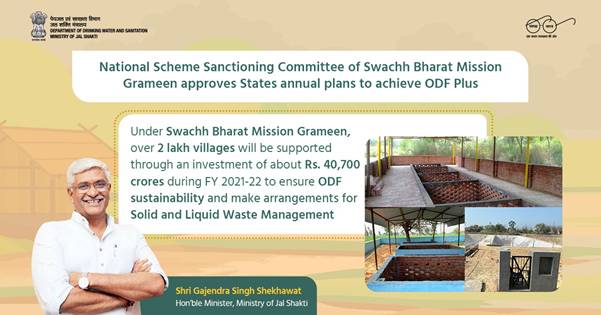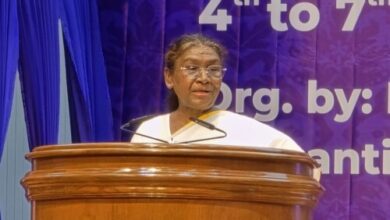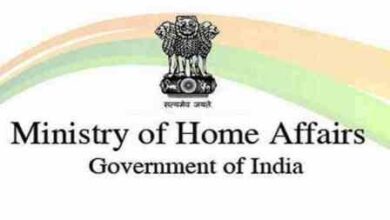Rs 40,700 crores allocated under Swacch Bharat Mission

Rs 40,700 crores allocated under Swacch Bharat Mission (Grameen) towards SLWM support for over 2 Lakh Villages in 2021-22
The Ministry of Jal Shakti under Swachh Bharat Mission Grameen (SBM-G) Phase 2 is poised to support over two lakh villages achieve solid and liquid waste management (SLWM) arrangements through an investment of over Rs. 40,700 crores in the present FY 2021-22. The National Scheme Sanctioning Committee (NSSC) of SBM-G under the Chairmanship of Secretary, Ministry of Jal Shakti approved the Annual Implementation Plan (AIP) of States and UTs.
While the Central share would be around Rs.14,000 crores, the States shall spend over Rs.8300 crores. Funds to the tune of Rs. 12,730 crores will be made available through the Fifteenth Finance Commission and over Rs.4,100 through convergence with MGNREGS. Further, over Rs.1500 crore will be invested by the States through other sources e.g. Business Model, CSR, other schemes, etc. SBM(G) Phase 2 aims at achieving comprehensive cleanliness in villages also called ODF Plus status by focusing on ODF sustainability and ensuring SLWM arrangements in villages.
Implementation of Swachh Bharat Mission Grameen Phase 2 in 2021-2022 will see construction of over 50 lakh Individual Household toilets (IHHLs), one Lakh Community toilets, Plastic Waste Management Units in over 2400 Blocks of India, Gobardhan projects in 386 Districts, Faecal sludge management arrangements in over 250 Districts apart from the targeted support for over 2 lakh villages in implementation of SLWM interventions.
Approving the State Plans, Secretary, Ministry of Jal Shakti, highlighted the need to ensure that no one is left behind, and every household has access to a toilet. He emphasized on the adoption of twin pit toilet technology for IHHLs construction as it is relatively safer, low cost and easier to operate and maintain. He also stressed on the need for low cost technologies for solid and liquid waste management as it would help decentralized operation and maintenance.
Earlier Department of Drinking Water and Sanitation (DDWS) supported States and UTs to undertake a participatory planning exercise along with Districts and Rural Local Bodies to step up implementation of ODF plus elements and achieve results at scale. Each State/UT have developed their Annual Implementation plans that set out the implementation targets and strategy that would be adopted in the State/UT. Implementation of Swachh Bharat Mission is led by Rural Local Bodies and the mission has the reputation of being a unique janandolan on Swachhata in the country.

The National Scheme Sanction Committee comprises representatives of Ministry of Rural Development, Panchayati Raj, Ministry of Housing and Urban Affairs, representative from State Governments apart sector experts. The NSSC reviewed the plans of all States and UTs and provided them guidance to intensify implementation as sanitation and hygiene are of paramount importance in the pandemic times. NSSC emphasized on the effective utilization of Fifteenth Finance tied funds earmarked for sanitation.



